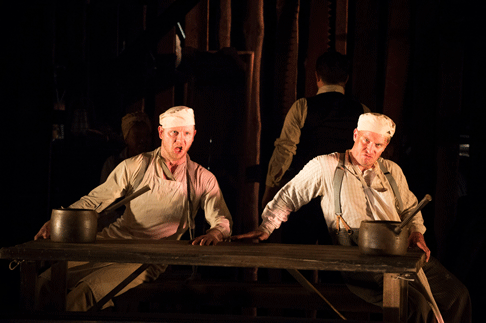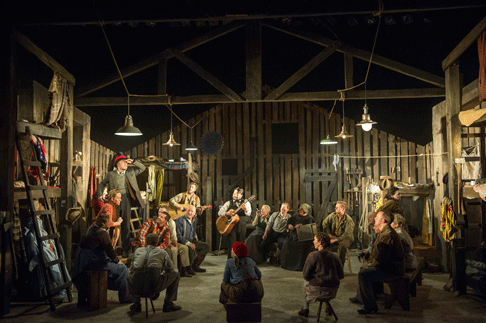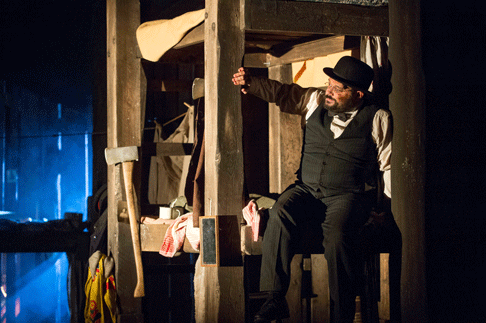He went to America, I think it was ‘38, early ‘39, and I went soon after. I think it wouldn’t be too much oversimplifying the situation to say that many of us young people at the time felt that Europe was more or less finished … I went to America and felt that I would make my future there.’ (Letters from a Life, vol.1, eds. Mitchell and Reed, p.619).
Premiered in May 1941 in the Brander Matthews Hall at Columbia University,
Paul Bunyan — the ‘choral operetta’ that Britten and Auden
created on the quintessentially American theme of the legend of the eponymous
pioneering lumberjack — might be seen as a naÔve attempt to beguile: an
offering intended to confirm their artistic credentials for American
citizenship. But it also hinted at the challenges ahead for a nation built upon
a Dream, as its people learn that they must balance individual choice with the
need to tolerate ‘difference’ and protect the ‘outsider’.
 Piotr Lempa (Ben Benny) and Stuart Haycock (Sam Sharkey)
Piotr Lempa (Ben Benny) and Stuart Haycock (Sam Sharkey)
It is a challenge to make something coherent of a work which offers both an
uplifting parable and symbolic inferences; both light-hearted Broadway gags and
more biting Thirties’ socialism. Britten’s score is an appealing medley of
deft pastiches — blues quartet, country and western ballad, jazz lament,
Gilbert and Sullivan comedy — each idiom following the next in quick
succession, with the odd extravagant Donizettian-duet thrown into the mix; but
the narrative thread is rather weak and the allegory at times ambiguous.
For this ETO production, director Liam Steel and set/costume designer Anna
Fleischle opted to keep things fairly simple, housing all the action in an
orthodox Loggers’ Cabin, and moving swiftly between the multifarious numbers
in the manner of a slick Broadway musical. Even the Western Union Boy (tenor
Matt R. J. Ward) was keen to get into the act, excitedly executing a polished
table-top routine that would not have shamed Fred Astaire.
Singing the limpid, swinging motif that is one of the few uniting elements
of the score, the unison chorus seemed a little slow to get going; but maybe
this is the point — for the soporific way of life of the ‘Old Trees’
(represented by tall timbers of wood), before man’s arrival on earth, is
overturned in this opening ensemble by the ambition and energy of the impatient
‘Young Trees’ (shorter burgeoning planks). In full voice by the end of the
number, the ETO chorus was impressively resonant, foreshadowing an even more
resplendent pinnacle, ‘O great day of discovery’, in Act 2.
Steel has decided to capitalise upon the fact that, while there is not much
of a narrative thread, there are lots of terrific individual musical numbers in
which Britten shows off his prowess as a master of pastiche and parody. The
choreography was slick, particularly given the limits of the stage space; this
is a genuine ‘company’ work, with the soloists coming forth from the
chorus, and the ensemble numbers were the highpoint. Especially notable were
the lumberjacks’ chorus in Act 1 in Act 1 — which utilised many a hackneyed
Broadway gag to cheerful effect — the Quartet of Swedes, and the loggers’
hyperbolic, competitive rivalry for Tiny’s attention.
One of the challenges for a director is how to present the oversized
eponymous hero who never actually appears on stage. Paul Bunyan is less a
‘character’ than an embodiment of man’s glorious spirit of conquest; but
he is a static element in the drama and presents difficulties with regard to
the integration of his projected, disembodied voice with the drama seen on
stage. Steel had an ingenuous solution: as the tale of his birth and life was
told by the collective gathering, Bunyan’s growth — from ‘six inches’,
he gained ‘346 pounds every week’ and ‘grew so fast, by the time he was
eight/ He was at tall as the Empire State’ — was illustrated by the
ascending top hat of Uncle Sam which, bedecked with red and blue band, was
lifted ever higher by successive members of the company, a metaphor for Bunyan
and a personification of the emergent nation. Subsequently, the awe-struck
loggers addressed their champion with gazes striving upwards, a rickety ladder
adorned with a bedraggled Star-Spangled Banner pointing to a distant pinnacle
of aspiration. Bunyan’s words were intoned sonorously but without
sententiousness by Damian Lewis.
 Company members
Company members
Tenor Mark Wilde skilfully conveyed the reflective introspection of Johnny
Inkslinger, the brooding ‘book keeper’, using a tender voice and expressive
nuance most sensitively. In his big Act 1 number, ‘Inkslinger’s Song’, in
which the troubled outsider reflects on the irreconcilable gap between the
simplicity of nature and the complexity of human culture, Wilde’s tone and
projection grew in a controlled fashion as the melody expanded from
recitative-like declamation to arioso outpouring. Although he was at times a
little pushed at the top, Wilde created a convincingly rounded character, a man
capable of complexity of feeling. Seated on a bunk, alone in the cabin, in
Inkslinger’s ‘Regret’, his despair in the face of the conflict between
hope and misfortune was poignant in its simplicity of articulation.
Elsewhere there was indulgent exuberance. Crooning an Italianate ‘Cooks’
duet’, bass Piotr Lempa (Ben Benny) and tenor Stuart Haycock (Sam Sharkey)
were deliciously camp. They made sure that we were aware that Auden’s slick
satire on vulgarity of an advertising culture which plays upon our insecurities
— ‘The Best People are crazy about soups! … Beans are all the rage among
the Higher Income Groups!’ — is just as apt now as in the 1930s.
The animal roles, cast for female voices, provide a welcome complement to
the rugged male voices that predominate, and Abigail Kelly, as the dog Fido,
and Amy J. Payne and Emma Watkinson, as the felines Moppet and Poppet, were
both alluring of voice and edgy of character: when feisty Fido joined the
courtesan cats in a piquant denouncement of social ills in the Act 2
‘Litany’, their appeal ‘Save animals and men’, made an impact. As the
loafer-flapping Geese, a form of life half-way between the trees and mankind,
Lorna Bridge, Annabel Mountford and Hannah Sawle also sang with vocal precision
and dramatic impact.
Many of these characters in this nascent nature are not only searching for
their future paths but also for their inner selves. Tenor Ashley Catling
revealed a thoughtfulness hidden by the logger’s brawn in Slim’s Song, as
he lamented, ‘I must hunt my shadow/ And the self I lack’. Baritone Wyn
Pencarreg was splendid as the bewildered foreman Hel Helson, a dull dunderhead
who is bewildered by life’s turns and tribulations. Pencarreg blindly
blustered in ‘The Mocking of Hel Helson’, brutally asserting ‘versions’
of his self — ‘Helson the Brave, the Fair, the Wise …’ — but also
winning our sympathy.
Helsons’s violent, futile assault on Bunyan is juxtaposed with the love
duet of Slim and Tiny, the latter role sung with sweet clarity and warmth by
mezzo soprano Caryl Hughes. Steel placed the frolicking lovers and the felled
logger on top and lower bunk respectively, surrounded by a chorus by turns
mournful then scornful — a delightful comic juxtaposition.
One detail which failed to convince was the sharing of the Narrator’s
ballads between Inkslinger and the company. It’s true that by allowing the
members of the collective to take successive lines of the guitar-accompanied
ballads, Steel allowed them to tell their own tale; but, the balladeer can lend
a useful ironic distance and serve as narrative link between the essentially
stand-alone numbers. And, Inkslinger himself is at one remove from the
collective, a man of words and thoughts, reflecting on his actions and motives,
achievements and future paths, much like Auden himself at this time; he is
decidedly not one of the herd.
In the rather dry acoustic of the Linbury Studio Theatre, Britten’s
economical woodwind-based orchestration provided a fitting commentary on the
vocal numbers; this was especially so in Inskslinger’s numbers. The ETO
orchestra was placed behind the back wall of the cabin, but the woodwind
pierced through crisp and clear, although some of the string resonance was
sacrificed. Conductor Philip Sunderland kept things moving along with many a
well-judged tempo: the jazz-inspired ‘Quartet of the Defeated’ was aptly
funereal.
There are dark undertones in this operetta, though: ‘Inkslinger’s
Song’ concludes with an outpouring of the social conscience of the 1930s:
‘Oh, but where are the beautiful places/ Where what you begin you complete,/
Where the joy shine out of men’ faces,/ And all get sufficient to eat?’.
For all its virtues, Steel’s rather homespun reading didn’t always capture
this aspect. Indeed, Paul Bunyan’s ‘Goodnight’ which closes Act 1 (a
passage which was added by Britten during revisions to the score in 1974) put
me in mind of the 1970s television show The Waltons — as darkness
fell and the lapping dog quietened, I half expected to hear ‘G’night
John-Boy’ echoing from the loggers’ bunks!
 Mark Wilde (Johnny Inkslinger)
Mark Wilde (Johnny Inkslinger)
One of the side-effects of the almost relentlessly up-beat feeling was that
moments of stillness and import did not always make their full impact. One of
the most powerful musico-dramatic moments comes in the opening scene when
‘the whole pattern of life is altered’ and ‘the moon turns blue’: the
logger who enthusiastically slapped blue paint on the cog-wheel perched high up
the cabin wall raised a wry titter, but I’m not sure that this really
captured the romance of Britten’s ethereal ‘gamelan’ colours and
harmonies.
Similarly, at the end, Bunyan’s final words to the emergent nation were somewhat lost, as the party-goers began clearing up the debris of the celebration. Perhaps Steel was making a subtle point: Bunyan says, ‘America is what you do/ America is I and you, /America is what you choose to make it’, but these Americans did not listen and failed to recognise their responsibilities, individual and collective. In the closing moments, Steel attempted to add some political depth to the production. If the action had already suggested that the American Dream was flawed at the start, then the future certainly did not look good for these loggers, judging by the contents of the wicker basket left by Bunyan for the loggers, like a prophesy to be resignedly accepted or actively resisted. Bent intently, and to the incredulity of the onlookers, Inkslinger withdrew first a pistol, then a lurid Guantanamo jumpsuit, followed by an overly large Bible (presaging the influence of the Christian Right?), a shabby copy of Playboy, some fast food wrappers, a lap-top, a periwig and noose. This chain of emblems of the institutions of state and finance spoke powerfully. The final image of black soprano Abigail Kelly, draped with a crumpled Stars and Stripes, was a poignant one.
Claire Seymour
English Touring Opera’s productions of King Priam, Paul Bunyan and The
Magic Flute continue at the Linbury Studio Theatre until 22nd
February and then tour until 31st May. See www.englishtouringopera.org.uk
for further details.
Cast and production information:
Paul Bunyan, Damian Lewis; Jonny Inkslinger, Mark Wilde; Hel Helson,
Wyn Pencarreg; Tiny, Caryl Hughes; Hot Biscuit Slim, Ashley Catling; Sam
Sharkey/Andy Anderson, Stuart Haycock; Ben Benny, Piotr Lempa; Fido, Abigail
Kelly; Moppet, Amy J Payne; Poppet/Moon, Emma Watkinson; Western Union Boy,
Matt R J Ward; John Shears/Blues Singer, Adam Tunnicliffe; Cross
Crosshaulson/Farmer Matthew Sprange; Blues Singer/Crony, Johnny Herford; Blues
Singer/Crony, Henry Manning; Jen Jenson/Crony, Maciek O’Shea; Pete Peterson,
Simon Gfeller; Goose/Wind, Hannah Sawle; Goose, Lorna Bridge; Goose/Heron,
Annabel Mountford; Blues Singer/Squirrel, Helen Johnson; Beetle, Susan Moore;
Young Tree/Boy, Emily-Jane Thomas; Conductor, Philip Sunderland; Director, Liam
Steel; Designer, Anna Fleischle; Lighting Designer, Guy Hoare; Assistant
Director, Dafydd Hall Williams. Linbury Studio Theatre, Royal Opera House,
Covent Garden, London, Wednesday 19th February 2014.
image=http://www.operatoday.com/ETO_PaulBunyan_2649.gif
image_description=Ashley Catling (Hot Biscuit Slim) and Caryl Hughes (Tiny). [Photo by Richard Hubert Smith courtesy English Touring Opera]
product=yes
product_title=Benjamin Britten: Paul Bunyan
product_by=A review by Claire Seymour
product_id=Above: Ashley Catling (Hot Biscuit Slim) and Caryl Hughes (Tiny).
Photos © Richard Hubert Smith courtesy English Touring Opera